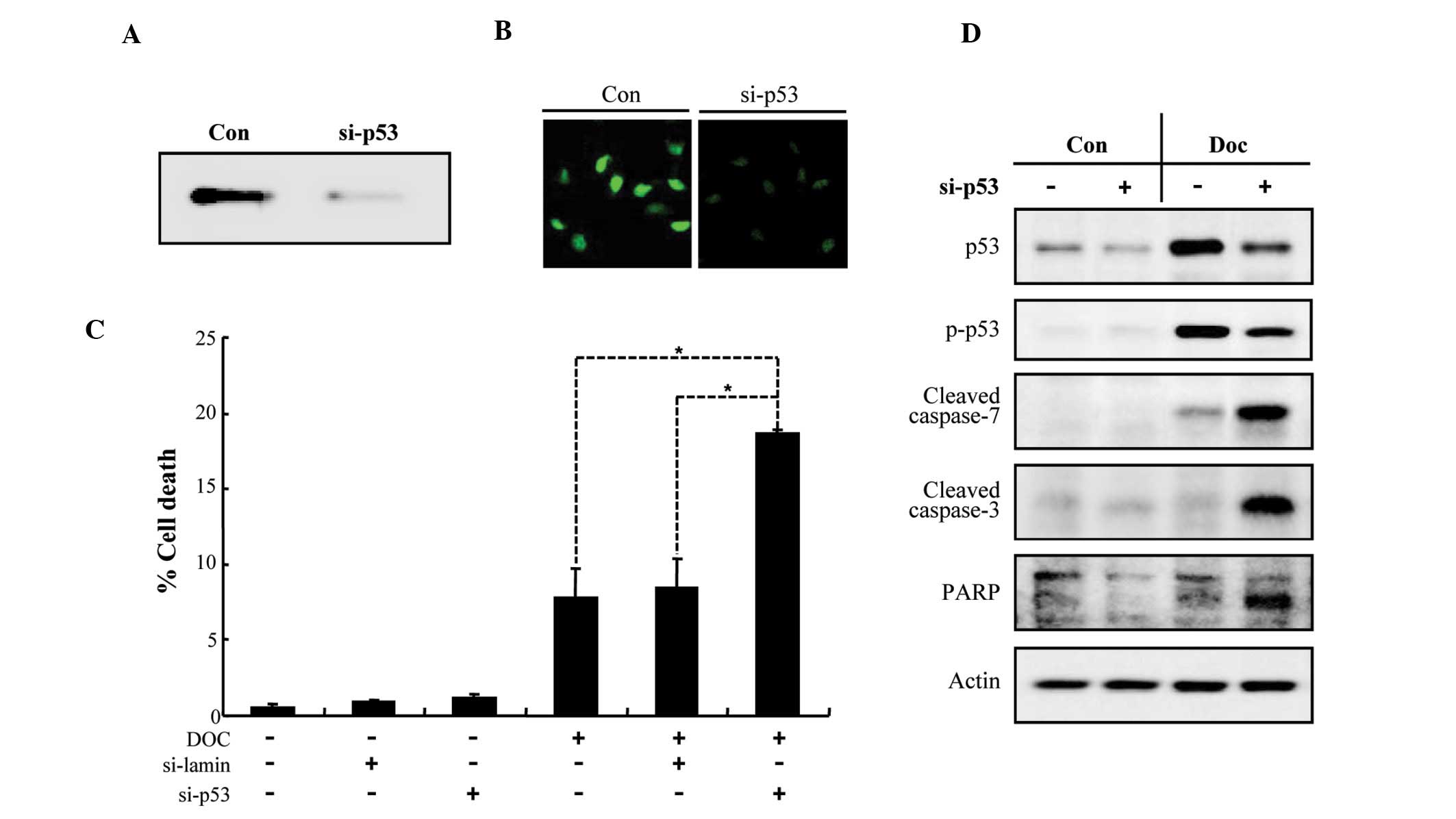|
1
|
Rowinsky EK: The development and clinical
utility of the taxane class of antimicrotubule chemotherapy agents.
Annu Rev Med. 48:353–374. 1997. View Article : Google Scholar : PubMed/NCBI
|
|
2
|
Diaz JF and Andreu JM: Assembly of
purified GDP-tubulin into microtubules induced by taxol and
taxotere: reversibility, ligand stoichiometry, and competition.
Biochemistry. 32:2747–2755. 1993. View Article : Google Scholar : PubMed/NCBI
|
|
3
|
Lavelle F, Bissery MC, Combeau C, Riou JF,
Vrignaud P and André S: Preclinical evaluation of docetaxel
(Taxotere). Semin Oncol. 22:3–16. 1995.
|
|
4
|
Crown J and O’Leary M: The taxanes: an
update. Lancet. 355:1176–1178. 2000. View Article : Google Scholar : PubMed/NCBI
|
|
5
|
Wang TH, Popp DM, Wang HS, et al:
Microtubule dysfunction induced by paclitaxel initiates apoptosis
through both c-Jun N-terminal kinase (JNK)-dependent and
-independent pathways in ovarian cancer cells. J Biol Chem.
274:8208–8216. 1999. View Article : Google Scholar
|
|
6
|
Blagosklonny MV, Schulte TW, Nguyen P,
Mimnaugh EG, Trepel J and Neckers L: Taxol induction of
p21WAF1 and p53 requires c-raf-1. Cancer Res.
55:4623–4626. 1995.PubMed/NCBI
|
|
7
|
Haldar S, Chintapalli J and Croce CM:
Taxol induces bcl-2 phosphorylation and death of prostate cancer
cells. Cancer Res. 56:1253–1255. 1996.PubMed/NCBI
|
|
8
|
Bacus SS, Gudkov AV, Lowe M, et al:
Taxol-induced apoptosis depends on MAP kinase pathways (ERK and
p38) and is independent of p53. Oncogene. 20:147–155. 2001.
View Article : Google Scholar : PubMed/NCBI
|
|
9
|
Morse DL, Gray H, Payne CM and Gillies RJ:
Docetaxel induces cell death through mitotic catastrophe in human
breast cancer cells. Mol Cancer Ther. 4:1495–1504. 2005. View Article : Google Scholar : PubMed/NCBI
|
|
10
|
Kim JY, Chung JY, Lee SG, et al: Nuclear
interaction of Smac/DIABLO with Survivin at G2/M arrest prompts
docetaxel-induced apoptosis in DU145 prostate cancer cells. Biochem
Biophys Res Commun. 350:949–954. 2006. View Article : Google Scholar : PubMed/NCBI
|
|
11
|
Woods CM, Zhu J, McQueney PA, Bollag D and
Lazarides E: Taxol-induced mitotic block triggers rapid onset of a
p53-independent apoptotic pathway. Mol Med. 1:506–526.
1995.PubMed/NCBI
|
|
12
|
Debernardis D, Siré EG, De Feudis P, et
al: p53 status does not affect sensitivity of human ovarian cancer
cell lines to paclitaxel. Cancer Res. 57:870–874. 1997.PubMed/NCBI
|
|
13
|
Takahashi M, Kigawa J, Minagawa Y, et al:
Sensitivity to paclitaxel is not related to p53-dependent apoptosis
in ovarian cancer cells. Eur J Cancer. 36:1863–1868. 2000.
View Article : Google Scholar : PubMed/NCBI
|
|
14
|
Osaki S, Nakanishi Y, Takayama K, Pei XH,
Ueno H and Hara N: Alteration of drug chemosensitivity caused by
the adenovirus-mediated transfer of the wild-type p53 gene in human
lung cancer cells. Cancer Gene Ther. 7:300–307. 2000. View Article : Google Scholar : PubMed/NCBI
|
|
15
|
Sezgin C, Karabulut B, Uslu R, et al:
Potential predictive factors for response to weekly paclitaxel
treatment in patients with metastatic breast cancer. J Chemother.
17:96–103. 2005. View Article : Google Scholar : PubMed/NCBI
|
|
16
|
Reinecke P, Kalinski T, Mahotka C, et al:
Paclitaxel/Taxol sensitivity in human renal cell carcinoma is not
determined by the p53 status. Cancer Lett. 222:165–171. 2005.
View Article : Google Scholar : PubMed/NCBI
|
|
17
|
Wahl AF, Donaldson KL, Fairchild C, et al:
Loss of normal p53 function confers sensitization to Taxol by
increasing G2/M arrest and apoptosis. Nat Med. 2:72–79. 1996.
View Article : Google Scholar : PubMed/NCBI
|
|
18
|
Cassinelli G, Supino R, Perego P, et al: A
role for loss of p53 function in sensitivity of ovarian carcinoma
cells to taxanes. Int J Cancer. 92:738–747. 2001. View Article : Google Scholar : PubMed/NCBI
|
|
19
|
Vogelstein B: Cancer. A deadly
inheritance. Nature. 348:681–682. 1990. View Article : Google Scholar : PubMed/NCBI
|
|
20
|
Bates S and Vousden KH: p53 in signaling
checkpoint arrest or apoptosis. Curr Opin Genet Dev. 6:12–18. 1996.
View Article : Google Scholar : PubMed/NCBI
|
|
21
|
Clarke AR, Purdie CA, Harrison DJ, et al:
Thymocyte apoptosis induced by p53-dependent and independent
pathways. Nature. 362:849–852. 1993. View
Article : Google Scholar : PubMed/NCBI
|
|
22
|
Lee JM and Bernstein A: p53 mutations
increase resistance to ionizing radiation. Proc Natl Acad Sci USA.
90:5742–5746. 1993. View Article : Google Scholar : PubMed/NCBI
|
|
23
|
Lowe SW, Schmitt EM, Smith SW, Osborne BA
and Jacks T: p53 is required for radiation-induced apoptosis in
mouse thymocytes. Nature. 362:847–849. 1993. View Article : Google Scholar : PubMed/NCBI
|
|
24
|
Brown R, Clugston C, Burns P, et al:
Increased accumulation of p53 protein in cisplatin-resistant
ovarian cell lines. Int J Cancer. 55:678–684. 1993. View Article : Google Scholar : PubMed/NCBI
|
|
25
|
Fan S, Smith ML, Rivet DJ II, et al:
Disruption of p53 function sensitizes breast cancer MCF-7 cells to
cisplatin and pentoxifylline. Cancer Res. 55:1649–1654.
1995.PubMed/NCBI
|
|
26
|
Hawkins DS, Demers GW and Galloway DA:
Inactivation of p53 enhances sensitivity to multiple
chemotherapeutic agents. Cancer Res. 56:892–898. 1996.PubMed/NCBI
|
|
27
|
van Bree C, Savonije JH, Franken NA,
Haveman J and Bakker PJ: The effect of p53-function on the
sensitivity to paclitaxel with or without hyperthermia in human
colorectal carcinoma cells. Int J Oncol. 16:739–744.
2000.PubMed/NCBI
|
|
28
|
Matsuhashi N, Saio M, Matsuo A, Sugiyama Y
and Saji S: Apoptosis induced by 5-fluorouracil, cisplatin and
paclitaxel are associated with p53 gene status in gastric cancer
cell lines. Int J Oncol. 26:1563–1567. 2005.PubMed/NCBI
|



















